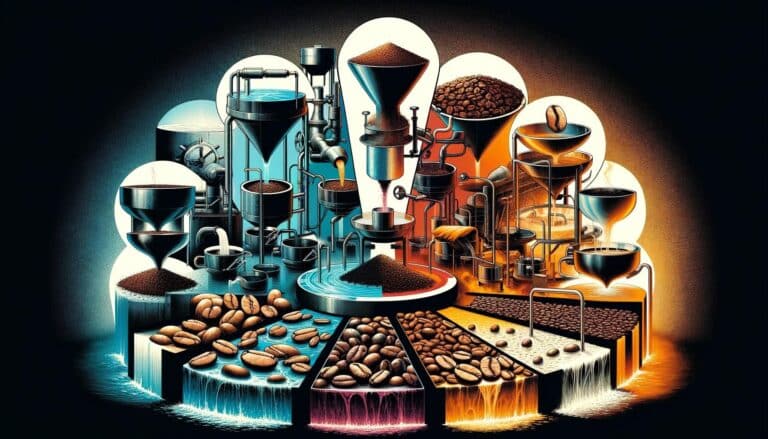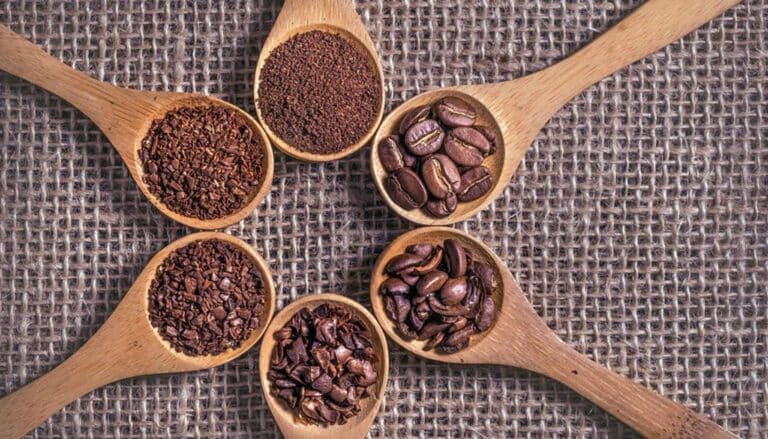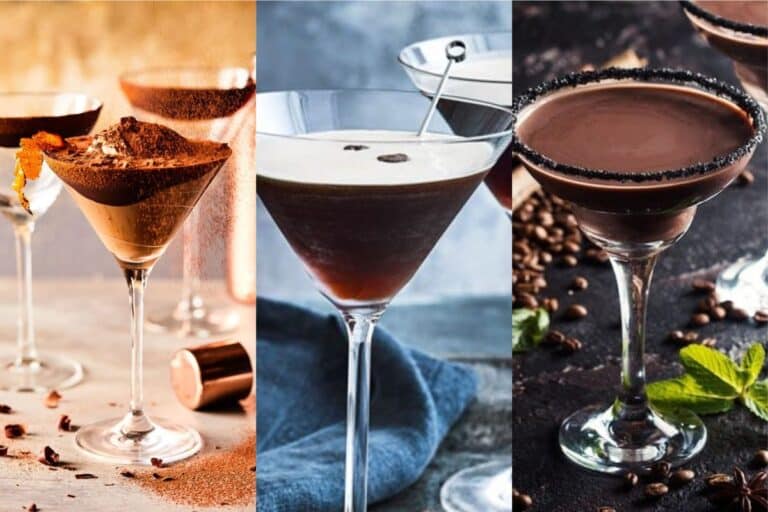Coffee, one of the world’s most beloved beverages, is celebrated not just for its ability to energize but also for its rich and complex flavor profile. The journey from bean to cup is both an art and a science, deeply influenced by each step in the coffee brewing process. This article delves into a pivotal question for coffee aficionados and casual drinkers alike: does coffee taste better when you grind the beans just before brewing?
To understand this, we must first explore the basics of coffee brewing. Brewing coffee is, at its core, the process of extracting flavors from coffee beans using water. This process can vary widely, from the rapid pressure-driven extraction of an espresso machine to the slow steeping of a French press. Each method has its nuances, but they all share a common goal: to unlock and capture the rich array of flavors contained within the coffee beans.
Central to this discussion is the importance of coffee bean quality. Coffee beans are the seeds of the Coffea plant’s fruit, often referred to as cherries. These beans undergo various processes like washing, drying, and roasting, each contributing to the flavor of the final product. The quality of the beans is influenced by numerous factors, including the variety of the plant, the growing conditions, the method of processing, and the roast level. High-quality beans are essential for a good cup of coffee, but how these beans are handled just before brewing – particularly whether they are ground fresh or pre-ground – plays a crucial role in determining the final flavor of the coffee.
This article aims to unravel the impact of grinding coffee beans on their flavor and, consequently, on the overall quality of the coffee. We will explore the science behind coffee beans, the grinding process, and how it all translates into the taste that reaches your cup. Whether you’re a seasoned coffee enthusiast or just someone who enjoys a good cup, understanding these aspects can elevate your coffee experience. Let’s dive into the world of coffee beans and discover if grinding them fresh truly makes a difference in your brew.
Does Coffee Taste Better When You Grind the Beans Before Brewing?
Yes, coffee generally tastes better when you grind the beans just before brewing. This is because grinding the beans releases their oils and flavors, which are at their freshest and most potent right after grinding. Pre-ground coffee, on the other hand, loses these oils and flavors over time, leading to a less flavorful cup. Freshly grinding your beans ensures a richer and more robust flavor profile.
Understanding Coffee Beans
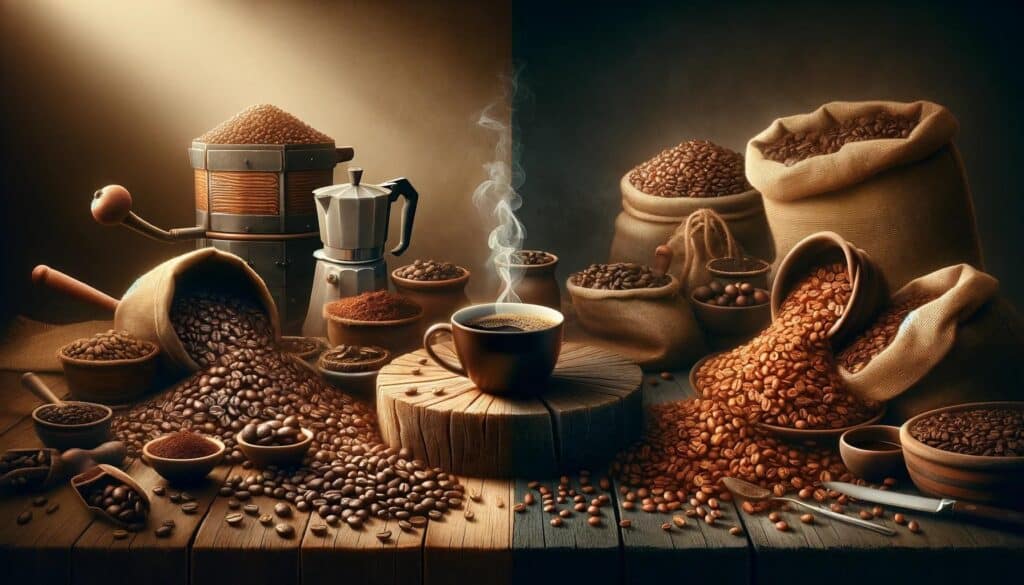
The Anatomy of a Coffee Bean
- Composition and Characteristics
- Structure of a Coffee Bean: Description of the layers from the outer skin to the inner core, including the parchment, silver skin, and the bean itself.
- Chemical Composition: Overview of the compounds in coffee beans, such as caffeine, acids, sugars, and oils, and how they contribute to the overall taste and aroma.
- Flavor Compounds in Coffee Beans
- Origin of Flavors: Discussion on how different compounds are responsible for various flavor notes in coffee, ranging from fruity and floral to nutty and earthy.
- Roasting’s Impact: Examination of how the roasting process alters these compounds, affecting the flavor profile and intensity of the coffee bean.
The Role of Freshness in Coffee Beans
- How Aging Affects Coffee Beans
- Degradation Over Time: Exploration of the chemical changes that occur in coffee beans over time, such as oxidation and the loss of volatile compounds, and how these changes degrade flavor.
- Staling Process: Insight into how and why coffee beans become stale, including factors like exposure to air, light, and moisture.
- Comparing Pre-ground vs. Whole Beans
- Surface Area and Exposure: Analysis of how grinding increases the surface area of coffee, accelerating the loss of flavor and aroma due to increased exposure to air and moisture.
- Flavor Preservation: Discussion on the benefits of grinding coffee beans immediately before brewing, focusing on the preservation of flavor and aroma compounds compared to pre-ground coffee.
The Grinding Process
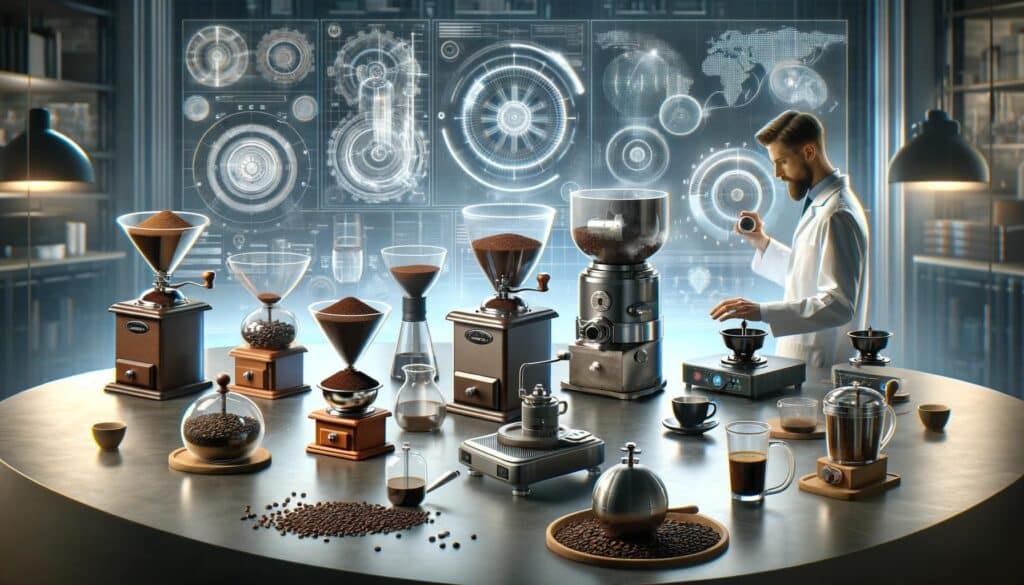
Types of Coffee Grinders
- Burr vs. Blade Grinders
- Mechanics and Differences: Explanation of how burr and blade grinders work, highlighting the differences in their grinding mechanisms.
- Consistency and Control: Discussion on how the consistency of the grind from burr grinders contributes to a more balanced extraction compared to the uneven grind of blade grinders.
- Impact of Grind Size on Flavor
- Matching Grind to Brewing Method: Exploration of how different brewing methods require different grind sizes, from the fine grind of espresso to the coarse grind for French press.
- Extraction and Taste: Analysis of how grind size affects extraction rates during brewing and how this influences the flavor profile of the coffee, including bitterness and acidity.
The Science of Grinding
- How Grinding Affects Surface Area and Extraction
- Increased Surface Area: Description of how grinding increases the surface area of coffee beans, allowing for more efficient and complete extraction of flavors.
- Rate of Extraction: Insight into how finer grinds lead to faster extraction, and the risk of over-extraction, which can result in bitter flavors.
- Optimal Grinding Practices for Flavor Preservation
- Grinding Fresh: Emphasis on the importance of grinding coffee beans immediately before brewing to preserve flavor and aroma.
- Grind Size Adjustment: Guidance on adjusting grind size based on the chosen brewing method and personal taste preferences, aiming for a balance between under-extraction (sourness) and over-extraction (bitterness).
Brewing Freshly Ground Coffee
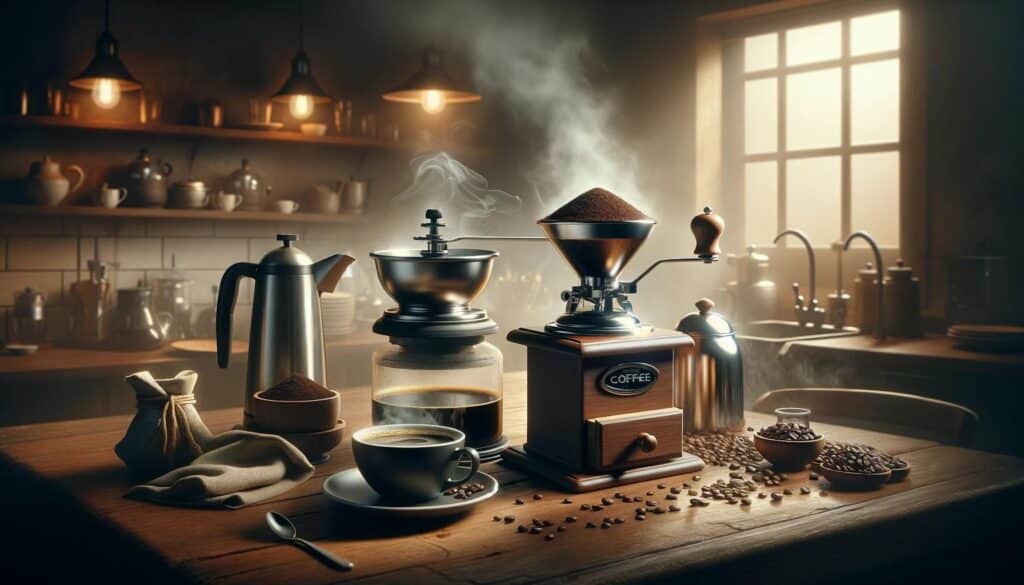
Comparing Brewing Methods
- French Press, Drip, Espresso, and Others
- French Press: Discussion on how the coarse grind used in French press brewing allows for a full-bodied, rich flavor, emphasizing the importance of a consistent grind for even extraction.
- Drip Coffee: Analysis of how medium grind works best with drip coffee makers, and how freshly ground beans can enhance flavor clarity and reduce bitterness.
- Espresso: Exploration of the need for a fine, consistent grind for espresso to achieve the high pressure needed for a concentrated shot, and how freshness affects the crema and flavor intensity.
- Other Methods: Brief overview of other brewing methods like AeroPress, cold brew, and pour-over, and their specific grind requirements and flavor outcomes.
- How Each Method Interacts with Freshly Ground Beans
- Flavor Extraction Differences: Explanation of how each brewing method extracts different flavor profiles from freshly ground beans.
- Importance of Grind Freshness: Emphasis on how the freshness of the grind plays a crucial role across all brewing methods in achieving the best flavor.
Expert Opinions and Studies
- Insights from Baristas and Coffee Experts
- Professional Perspectives: Collection of opinions and tips from experienced baristas and coffee roasters on the impact of grinding beans just before brewing.
- Best Practices in Coffee Shops: Insight into how coffee shops manage bean freshness and grinding to consistently deliver high-quality coffee.
- Review of Scientific Studies on Coffee Taste and Quality
- Academic Research Findings: Overview of scientific studies that have investigated the relationship between grind freshness, brewing methods, and the resulting taste of the coffee.
- Quantifiable Impacts on Flavor: Presentation of data and conclusions from these studies, providing an evidence-based look at how freshly ground beans contribute to coffee quality.
Personal Preferences and Practical Considerations

The Role of Individual Taste
- Subjectivity in Coffee Flavor Preferences
- Variability in Palates: Discussion on how individual taste preferences vary, with some people preferring bold, strong flavors, while others may enjoy milder or more acidic profiles.
- Influence of Cultural and Personal Experiences: Exploration of how cultural background and personal experiences shape coffee preferences.
- How to Experiment with Grinding at Home
- Trial and Error: Encouragement for readers to experiment with different beans, grind sizes, and brewing methods to discover their preferred taste.
- Guidance on Tasting: Simple tips on how to conduct home coffee tastings, paying attention to aroma, flavor, body, and aftertaste.
Balancing Quality, Convenience, and Cost
- Time and Effort Considerations
- Daily Routine Impact: Realistic look at the time and effort involved in grinding beans at home, considering busy lifestyles.
- Convenience vs. Quality: Discussion on finding a balance between the convenience of pre-ground coffee and the quality improvement of grinding fresh beans.
- Cost Analysis of Grinding at Home vs. Buying Pre-ground
- Initial Investment: Examination of the cost of purchasing a grinder and different types of coffee beans.
- Long-term Savings: Analysis of potential long-term savings from buying whole beans in bulk versus pre-ground coffee.
- Quality of Experience: Consideration of the qualitative aspects, such as the enjoyment and satisfaction derived from the process of grinding and brewing.
Conclusion
In the quest for the perfect cup of coffee, our journey has taken us through the intricate world of coffee beans, the science of grinding, various brewing methods, and the balance of personal preferences with practical considerations. Here’s a recap of the key insights:
- The Essence of Coffee Beans: We explored the anatomy and composition of coffee beans, understanding how their flavor compounds are pivotal to the taste of the coffee.
- The Impact of Grinding: We learned that grinding coffee beans just before brewing can significantly enhance flavor by preserving the beans’ essential oils and freshness. The choice between burr and blade grinders, along with the appropriate grind size, plays a crucial role in flavor extraction.
- Brewing Methods and Freshness: Each brewing method, from French press to espresso, interacts uniquely with freshly ground beans, extracting distinct flavor profiles and highlighting the importance of grind freshness across all methods.
- Personal Taste and Practicality: The subjectivity of coffee preferences was emphasized, encouraging experimentation at home to find your ideal cup. We also discussed the practical aspects of grinding at home, balancing quality with convenience and cost.
As we conclude, it’s clear that while grinding coffee beans just before brewing requires extra effort, the potential for a superior taste experience is significant. The world of coffee is vast and varied, and there’s no one-size-fits-all approach. Whether you’re a seasoned coffee enthusiast or a curious beginner, the key is to experiment. Try different beans, grinders, grind sizes, and brewing methods. Pay attention to how changes in the process affect the flavor, aroma, and overall experience of your coffee.
Remember, the pursuit of the perfect cup of coffee is a personal journey, one that evolves with your tastes and preferences. So, embrace the process, explore the nuances, and most importantly, enjoy each cup. Happy brewing!
